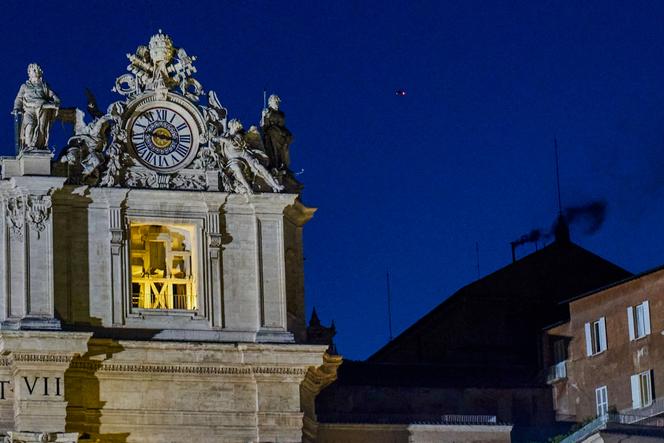


Black smoke poured out of the Sistine Chapel chimney on Wednesday, May 7, signaling that no pope had been elected as 133 cardinals opened the secretive, centuries-old ritual to choose a new leader of the Catholic Church. The cardinals participating in the most geographically diverse conclave in the faith’s 2,000-year history took just one round of voting Wednesday evening. After failing to find a winner on the first ballot, they retired for the night and will return to the Sistine Chapel on Thursday morning to try to find a successor to Pope Francis.
They had opened the conclave Wednesday afternoon, participating in a rite more theatrical than even Hollywood could create. Outside in St. Peter’s Square, the scene was festive, as thousands of people flocked to the piazza to watch the proceedings on giant video screens, applauding when the Sistine Chapel’s doors slammed shut and the voting began. They waited for hours, watching screens that showed just a skinny chimney and occasional seagull. After the vote dragged on to dinnertime, some left in frustration, but those who stayed cheered when the smoke finally billowed out.
Hailing from 70 countries, the cardinals were sequestered Wednesday from the outside world, their cellphones surrendered and airwaves around the Vatican jammed to prevent all communications until they find a new pope. Many cardinals hadn’t met until last week and lamented they needed more time to get to know one another, raising questions about how long it might take for one man to secure the two-thirds majority, or 89 ballots, necessary to become the 267th pope.
The cardinals had entered the Sistine Chapel in pairs, chanting the meditative "Litany of the Saints" as Swiss Guards stood at attention. Cardinal Pietro Parolin, the 70-year-old secretary of state under Francis and himself a leading contender to succeed him as pope, assumed the leadership of the proceedings as the senior cardinal under age 80 eligible to participate. Earlier in the day, the dean of the College of Cardinals, Cardinal Giovanni Battista Re, presided over a morning Mass in St. Peter’s Basilica urging the voters to set aside all personal interests and find a pope who prizes unity. He prayed for a pope who could awaken the conscience of the world.
After the cardinals took their oaths, the master of papal liturgical ceremonies, Archbishop Diego Ravelli, called out "extra omnes" − Latin for "all out" − and anyone not eligible to vote left before the chapel doors closed. An elderly cardinal remained to deliver a meditation, but after he finished, he too, had to leave since he was too old to vote. While cardinals this week said they expected a short conclave, it will likely take at least a few rounds of voting. For much of the past century, it has taken between three and 14 ballots to find a pope.
